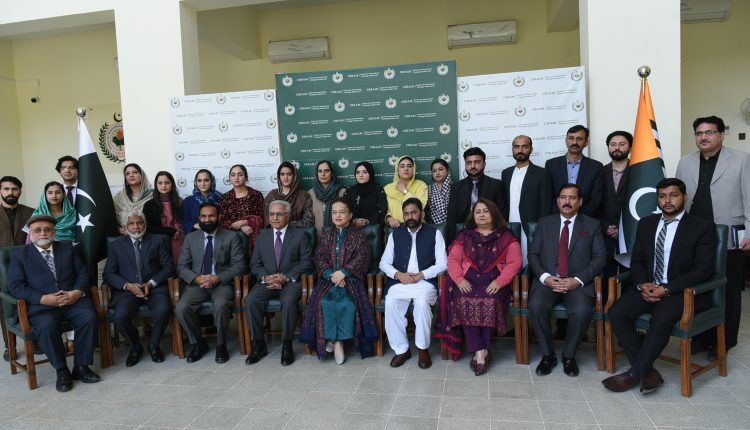VCs adopt communiqué on digital learning, quality enhancement, and regional collaboration
MUZAFFARABAD, November 11: University leaders and policymakers from across Azad Jammu and Kashmir (AJK) have called for a collective transformation of the region’s higher education system, one that prioritizes research quality, digital competence, inclusivity, and institutional collaboration to meet the evolving needs of students and society.
Gathered at the Vice Chancellors’ Conference on Networking, Research, and Academic Collaboration, organized by the Centre for International Strategic Studies (CISS AJK), participants adopted a Joint Communiqué outlining a coordinated roadmap for reform. The communiqué proposed the formation of Thematic Working Groups on research, digital learning, and curriculum development, along with a sustained mechanism for inter-university coordination. It also recommended that the Vice Chancellors’ Conference be hosted on a rotational basis every quarter to ensure continuity of dialogue.
Addressing the forum virtually, Wajiha Qamar, Minister of State for Federal Education and Professional Training, said AJK’s universities could become “centres of excellence in every nook and corner of the state” if properly supported and aligned with future economic needs.
“We must strengthen our universities, align our degrees with the demands of industry, and build an educational ecosystem that nurtures innovation and responsibility,” she said, assuring that the federal government would continue to include AJK’s institutions in its national programs. She appreciated CISS AJK for bringing together academia and policymakers on one platform.
Welcoming the delegates, Dr Asma Shakir Khawaja, Executive Director of CISS AJK, said the Centre strives to serve as a bridge among universities to foster collaboration, capacity-building, and academic excellence. “The quality of higher education is a shared responsibility that requires collective wisdom, not isolated efforts,” she noted.
Zafar Iqbal Malik, AJK’s Minister for Higher Education, praised the initiative, describing it as “a timely effort to address critical gaps in quality and governance.” He emphasized that while the number of universities in the region has grown, the quality of graduates remains an urgent concern demanding unified action.
Vice chancellors raised a range of institutional issues, including financial strain and governance challenges, as well as poor internet connectivity and inadequate research infrastructure. Prof. Dr. Nasir Jamal Khattak, Vice Chancellor of the University of Azad Jammu and Kashmir, underscored the need for performance-based management and fiscal discipline, while Dr Anila Kamal, Vice Chancellor of the Women’s University of AJK, Bagh, identified persistent electricity shortages and weak digital infrastructure as obstacles to research and learning.
Other vice chancellors contributing to the dialogue included Brig. (R) Prof. Dr. Muhammad Younus Javed (MUST Mirpur), Lt. Gen. (R) Dr. Asif Mumtaz Sukhera (Mohi-ud-Din Islamic University), Muhammad Imtiaz Aqdas (Al-Khair University, Bhimber), and Prof. Dr. Khawaja Farooq Ahmed (University of Haveli).
In her closing statement, Syeda Tehreem Bukhari, Associate Director (Research) at CISS AJK, captured the essence of the day’s deliberations, emphasizing inclusive learning environments, meaningful academic visibility, digital literacy, and research connected to local realities. “Universities must evolve into dynamic institutions of knowledge and innovation rather than administrative extensions of the state,” she said.
The forum concluded with renewed optimism that through sustained cooperation, evidence-based policymaking, and investment in research and technology, the universities of AJK can emerge as regional leaders in higher education and engines of intellectual and economic growth
THE DAILY COUNTRY NEWS IS ONE OF THE PAKISTAN'S LARGEST ENGLISH-LANGUAGE NEWSPAPER. COUNTRY NEWS IS REGULARLY SCHEDULED PUBLICATION CONTAINING NATIONAL AND INTERNATIONAL NEWS, HEALTH NEWS, ARTICLES,BLOGS, INFOTAINMENT, ADVERTISEMENT AND MUCH MORE.

